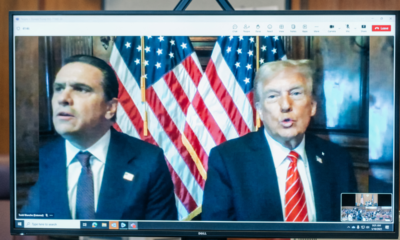Massachusetts
State of emergency: Massachusetts and migration – The Boston Globe

Migration into — and out of — Massachusetts
The Globe’s Sept. 9 front-page story “Healey: Speed up migrants’ work forms” documents what is indeed a “desperate need” for concerted federal assistance to address the continuing influx of migrants to cities like Boston, New York, and Chicago. Expedited, if not immediate, grants of work authorization — as urged by the governor and many others — are a key element of that assistance.
It’s humanitarian and civically responsible because it will enable migrants to support themselves legally with less support from the city and state, and not in the undocumented shadows, where they’re subject to workplace abuse by unscrupulous employers. It’s economically responsible because, as Healey points out, tens of thousands of available jobs in the Commonwealth are sorely in need of filling.
For the Biden administration, it’s also a political imperative. Those inclined to discredit the White House as ineffectual or worse can gleefully point to Democratic mayors of some of our largest cities who have called out the Biden team for its failure to act more decisively, and swing voters are no doubt taking notice. Biden’s taking every possible step to provide this new and needed workforce with the necessary papers might not be a silver bullet, but it will go far to address this multiple-front crisis.
Michael Felsen
Jamaica Plain
The writer is a senior adviser and Access to Justice fellow at Justice at Work and the strategic enforcement adviser at Workplace Justice Lab@Rutgers University.
Re “Healey: Speed up migrants’ work forms”: We already have a housing crisis and too much traffic — not surprising since we’re the third most densely populated state, after New Jersey and Rhode Island. Faster work authorizations will probably attract more migrants to Massachusetts and encourage more illegal immigration to the United States.
Our country cannot support unbridled immigration. The United States is running out of water. Among much else, an aquifer that waters half the nation’s rice production is losing water twice as fast as nature replenishes its supply.
Climate change will reduce carrying capacity still further. Within several decades, “millions” of Americans will become climate refugees, according to ProPublica.
If anything, we need to stabilize, or even reduce, our population. But the Census Bureau projects that our population will grow by 79 million over the next 40 years, 68 million of that — equivalent to 3.4 New York states — from mass immigration.
If we’re going to save our country for our progeny, we need to face the fact that we can’t save the world.
David C. Holzman
Lexington
The shelter crisis is only the tip of the iceberg
Re “Cities, towns call for help as migrants pour in” (Page A1, Sept. 8): The recent influx of migrants has pushed Massachusetts’ shelter capacity to the brink, raised serious concerns among local leaders, and led Governor Maura Healey to declare a state of emergency. Yet the shelter crisis is merely the tip of the iceberg. The deeper crisis is the severe statewide housing shortage that has been growing for decades, primarily due to municipal border controls, enforced through restrictive zoning regulations, which impede the construction of new housing.
High rents and home prices have already forced thousands of Massachusetts families out of their homes and communities. Massachusetts families, not just newly arrived migrants, have been forced to move into emergency shelters, double-up in crowded living conditions, or move to distant communities or other states where housing is more abundant and affordable. The Massachusetts rental vacancy rate of 2.8 percent, the lowest in the United States, is less than half the national rate of 6.3 percent. We also have, not coincidentally, the third highest rents.
If you can’t build more housing, then one solution is to reduce the population; in fact, Massachusetts has the fifth highest rate of domestic net migration in the country. In 2022 alone, more than 50,000 people left Massachusetts for other states, including many young adults who grew up here but could not afford to remain. This is our migration crisis; it is entirely of our own making and we can choose to solve it by removing the power of cities and towns to police their borders through restrictive zoning. If there was ever a need for declaring a state of emergency, this is it.
Bruce Ehrlich
Jamaica Plain

Massachusetts
Mass. gives noncompliant towns more time to meet MBTA zoning regulations

The Healey administration filed emergency regulations late Tuesday afternoon to implement the controversial law meant to spur greater housing production, after Massachusetts’ highest court struck down the last pass at drafting those rules.
The Supreme Judicial Court upheld the MBTA Communities Act as a constitutional law last week, but said it was “ineffective” until the governor’s Executive Office of Housing and Livable Communities promulgated new guidelines. The court said EOHLC did not follow state law when creating the regulations the first time around, rendering them “presently unenforceable.”
The emergency regulations filed Tuesday are in effect for 90 days. Over the next three months, EOHLC intends to adopt permanent guidelines following a public comment period, before the expiration of the temporary procedures, a release from the office said.
“The emergency regulations do not substantively change the law’s zoning requirements and do not affect any determinations of compliance that have been already issued by EOHLC. The regulations do provide additional time for MBTA communities that failed to meet prior deadlines to come into compliance with the law,” the press release said.
Massachusetts’ Supreme Judicial Court ruled that the state’s attorney general has the power to enforce the MBTA Communities Law, which requires communities near MBTA services to zone for more multifamily housing, but it also ruled that existing guidelines aren’t enforceable.
Follow NBC10 Boston:
https://instagram.com/nbc10boston
https://tiktok.com/@nbc10boston
https://facebook.com/NBC10Boston
Tweets by NBC10Boston
https://bsky.app/profile/nbcboston.com
The MBTA Communities Act requires 177 municipalities that host or are adjacent to MBTA service to zone for multifamily housing by right in at least one district.
Cities and towns are classified in one of four categories, and there were different compliance deadlines in the original regulations promulgated by EOHLC: host to rapid transit service (deadline of Dec. 31, 2023), host to commuter rail service (deadline of Dec. 31, 2024), adjacent community (deadline of Dec. 31, 2024) and adjacent small town (deadline of Dec. 31, 2025).
Under the emergency regulations, communities that did not meet prior deadlines must submit a new action plan to the state with a plan to comply with the law by 11:59 p.m. on Feb. 13, 2025. These communities will then have until July 14, 2025, to submit a district compliance application to the state.
Communities designated as adjacent small towns still face the Dec. 31, 2025 deadline to adopt compliant zoning.
The town of Needham voted Tuesday on a special referendum over whether to re-zone the town for 3,000 more units of housing under Massachusetts’ MBTA Communities law.
Follow NBC10 Boston:
https://instagram.com/nbc10boston
https://tiktok.com/@nbc10boston
https://facebook.com/NBC10Boston
Tweets by NBC10Boston
https://bsky.app/profile/nbcboston.com
Like the old version of the guidelines, the new emergency regulations gives EOHLC the right to determine whether a city or town’s zoning provisions to allow for multi-family housing as of right are consistent with certain affordability requirements, and to determine what is a “reasonable size” for the multi-family zoning district.
The filing of emergency regulations comes six days after the SJC decision — though later than the governor’s office originally projected. Healey originally said her team would move to craft new regulations by the end of last week to plug the gap opened up by the ruling.
“These regulations will allow us to continue moving forward with implementation of the MBTA Communities Law, which will increase housing production and lower costs across the state,” Healey said in a statement Tuesday. “These regulations allow communities more time to come into compliance with the law, and we are committed to working with them to advance zoning plans that fit their unique needs.”
A total of 116 communities out of the 177 subject to the law have already adopted multi-family zoning districts to comply with the MBTA Communities Act, according to EOHLC.
Massachusetts
Revere city councilor slams Massachusetts officials for being ‘woke’ after migrant shelter bust

A Revere city councilor says the state’s right-to-shelter law is a “perfect example” of how “woke” ideologies are harmful, as he addressed the arrest of a migrant who allegedly had an AR-15 and 10 pounds of fentanyl at a local hotel.
Originally Published:
Massachusetts
Massachusetts senator seeks to extend deadline for TikTok ban | TechCrunch

Senatory Ed Markey (D-Mass.) is planning to introduce legislation to extend the TikTok ban deadline by 270 days. TikTok has warned of a looming shutdown in just five days, but the new legislation, officially called the Extend the TikTok Deadline Act, would give TikTok more time to divest from its Chinese parent company ByteDance, if approved by Congress.
TikTok is currently expected to “go dark” on January 19, unless the Supreme Court intervenes to delay the ban. The Supreme Court is weighing the ban, and is expected to decide sometime this week whether the law behind the ban violates the First Amendment.
“As the January 19th deadline approaches, TikTok creators and users across the nation are understandably alarmed,” Markey said in a Senate floor speech on Monday. “They are uncertain about the future of the platform, their accounts, and the vibrant online communities they have cultivated. “These communities cannot be replicated on another app. A ban would dismantle a one-of-a-kind informational and cultural ecosystem, silencing millions in the process.”
Markey noted that while TikTok has its problems and poses a “serious risk” to the privacy and mental health of young people, a ban “would impose serious consequences on millions of Americans who depend on the app for social connections and their economic livelihood.”
Markey and Senator Rand Paul (R-Ky.), along with Congressman Ro Khanna (CA-17), recently submitted a bipartisan amicus brief urging the Supreme Court to reverse the D.C. Circuit Court’s decision that upheld the TikTok ban. The trio argued that the TikTok ban conflicts with the First Amendment.
-

 Health1 week ago
Health1 week agoOzempic ‘microdosing’ is the new weight-loss trend: Should you try it?
-
/cdn.vox-cdn.com/uploads/chorus_asset/file/25822586/STK169_ZUCKERBERG_MAGA_STKS491_CVIRGINIA_A.jpg)
/cdn.vox-cdn.com/uploads/chorus_asset/file/25822586/STK169_ZUCKERBERG_MAGA_STKS491_CVIRGINIA_A.jpg) Technology6 days ago
Technology6 days agoMeta is highlighting a splintering global approach to online speech
-

 Science4 days ago
Science4 days agoMetro will offer free rides in L.A. through Sunday due to fires
-
/cdn.vox-cdn.com/uploads/chorus_asset/file/25821992/videoframe_720397.png)
/cdn.vox-cdn.com/uploads/chorus_asset/file/25821992/videoframe_720397.png) Technology1 week ago
Technology1 week agoLas Vegas police release ChatGPT logs from the suspect in the Cybertruck explosion
-

 Movie Reviews1 week ago
Movie Reviews1 week ago‘How to Make Millions Before Grandma Dies’ Review: Thai Oscar Entry Is a Disarmingly Sentimental Tear-Jerker
-

 Health1 week ago
Health1 week agoMichael J. Fox honored with Presidential Medal of Freedom for Parkinson’s research efforts
-

 Movie Reviews1 week ago
Movie Reviews1 week agoMovie Review: Millennials try to buy-in or opt-out of the “American Meltdown”
-

 News1 week ago
News1 week agoPhotos: Pacific Palisades Wildfire Engulfs Homes in an L.A. Neighborhood


















